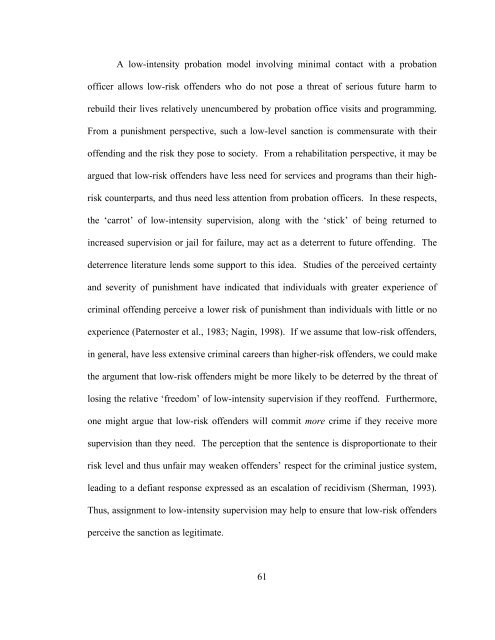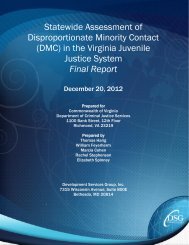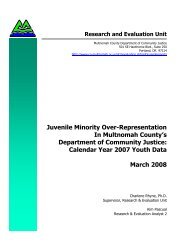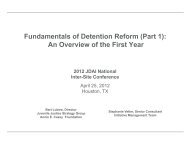The Effects of Sanction Intensity on Criminal Conduct - JDAI Helpdesk
The Effects of Sanction Intensity on Criminal Conduct - JDAI Helpdesk
The Effects of Sanction Intensity on Criminal Conduct - JDAI Helpdesk
Create successful ePaper yourself
Turn your PDF publications into a flip-book with our unique Google optimized e-Paper software.
A low-intensity probati<strong>on</strong> model involving minimal c<strong>on</strong>tact with a probati<strong>on</strong><br />
<str<strong>on</strong>g>of</str<strong>on</strong>g>ficer allows low-risk <str<strong>on</strong>g>of</str<strong>on</strong>g>fenders who do not pose a threat <str<strong>on</strong>g>of</str<strong>on</strong>g> serious future harm to<br />
rebuild their lives relatively unencumbered by probati<strong>on</strong> <str<strong>on</strong>g>of</str<strong>on</strong>g>fice visits and programming.<br />
From a punishment perspective, such a low-level sancti<strong>on</strong> is commensurate with their<br />
<str<strong>on</strong>g>of</str<strong>on</strong>g>fending and the risk they pose to society. From a rehabilitati<strong>on</strong> perspective, it may be<br />
argued that low-risk <str<strong>on</strong>g>of</str<strong>on</strong>g>fenders have less need for services and programs than their highrisk<br />
counterparts, and thus need less attenti<strong>on</strong> from probati<strong>on</strong> <str<strong>on</strong>g>of</str<strong>on</strong>g>ficers. In these respects,<br />
the ‘carrot’ <str<strong>on</strong>g>of</str<strong>on</strong>g> low-intensity supervisi<strong>on</strong>, al<strong>on</strong>g with the ‘stick’ <str<strong>on</strong>g>of</str<strong>on</strong>g> being returned to<br />
increased supervisi<strong>on</strong> or jail for failure, may act as a deterrent to future <str<strong>on</strong>g>of</str<strong>on</strong>g>fending. <str<strong>on</strong>g>The</str<strong>on</strong>g><br />
deterrence literature lends some support to this idea. Studies <str<strong>on</strong>g>of</str<strong>on</strong>g> the perceived certainty<br />
and severity <str<strong>on</strong>g>of</str<strong>on</strong>g> punishment have indicated that individuals with greater experience <str<strong>on</strong>g>of</str<strong>on</strong>g><br />
criminal <str<strong>on</strong>g>of</str<strong>on</strong>g>fending perceive a lower risk <str<strong>on</strong>g>of</str<strong>on</strong>g> punishment than individuals with little or no<br />
experience (Paternoster et al., 1983; Nagin, 1998). If we assume that low-risk <str<strong>on</strong>g>of</str<strong>on</strong>g>fenders,<br />
in general, have less extensive criminal careers than higher-risk <str<strong>on</strong>g>of</str<strong>on</strong>g>fenders, we could make<br />
the argument that low-risk <str<strong>on</strong>g>of</str<strong>on</strong>g>fenders might be more likely to be deterred by the threat <str<strong>on</strong>g>of</str<strong>on</strong>g><br />
losing the relative ‘freedom’ <str<strong>on</strong>g>of</str<strong>on</strong>g> low-intensity supervisi<strong>on</strong> if they re<str<strong>on</strong>g>of</str<strong>on</strong>g>fend. Furthermore,<br />
<strong>on</strong>e might argue that low-risk <str<strong>on</strong>g>of</str<strong>on</strong>g>fenders will commit more crime if they receive more<br />
supervisi<strong>on</strong> than they need. <str<strong>on</strong>g>The</str<strong>on</strong>g> percepti<strong>on</strong> that the sentence is disproporti<strong>on</strong>ate to their<br />
risk level and thus unfair may weaken <str<strong>on</strong>g>of</str<strong>on</strong>g>fenders’ respect for the criminal justice system,<br />
leading to a defiant resp<strong>on</strong>se expressed as an escalati<strong>on</strong> <str<strong>on</strong>g>of</str<strong>on</strong>g> recidivism (Sherman, 1993).<br />
Thus, assignment to low-intensity supervisi<strong>on</strong> may help to ensure that low-risk <str<strong>on</strong>g>of</str<strong>on</strong>g>fenders<br />
perceive the sancti<strong>on</strong> as legitimate.<br />
61
















